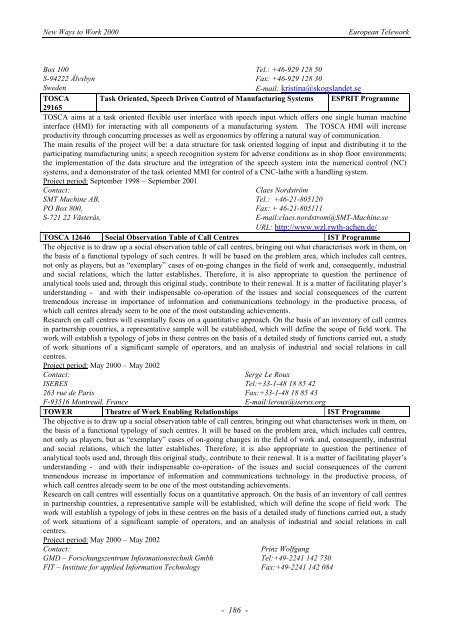eWORK 2000 - European Telework Week
eWORK 2000 - European Telework Week
eWORK 2000 - European Telework Week
- No tags were found...
You also want an ePaper? Increase the reach of your titles
YUMPU automatically turns print PDFs into web optimized ePapers that Google loves.
New Ways to Work <strong>2000</strong><strong>European</strong> <strong>Telework</strong>Box 100S-94222 ÄlvsbynSwedenTOSCATask Oriented, Speech Driven Control of Manufacturing SystemsTel.: +46-929 128 50Fax: +46-929 128 30E-mail: kristina@skogslandet.seESPRIT Programme29165TOSCA aims at a task oriented flexible user interface with speech input which offers one single human machineinterface (HMI) for interacting with all components of a manufacturing system. The TOSCA HMI will increaseproductivity through concurring processes as well as ergonomics by offering a natural way of communication.The main results of the project will be: a data structure for task oriented logging of input and distributing it to theparticipating manufacturing units; a speech recognition system for adverse conditions as in shop floor environments;the implementation of the data structure and the integration of the speech system into the numerical control (NC)systems, and a demonstrator of the task oriented MMI for control of a CNC-lathe with a handling system.Project period: September 1998 – September 2001Contact:SMT Machine AB,PO Box 800,S-721 22 Västerås,Claes NordströmTel.: +46-21-805120Fax: + 46-21-805111E-mail:claes.nordstrom@SMT-Machine.seURL: http://www.wzl.rwth-achen.de/TOSCA 12646 Social Observation Table of Call Centres IST ProgrammeThe objective is to draw up a social observation table of call centres, bringing out what characterises work in them, onthe basis of a functional typology of such centres. It will be based on the problem area, which includes call centres,not only as players, but as “exemplary” cases of on-going changes in the field of work and, consequently, industrialand social relations, which the latter establishes. Therefore, it is also appropriate to question the pertinence ofanalytical tools used and, through this original study, contribute to their renewal. It is a matter of facilitating player’sunderstanding - and with their indispensable co-operation of the issues and social consequences of the currenttremendous increase in importance of information and communications technology in the productive process, ofwhich call centres already seem to be one of the most outstanding achievements.Research on call centres will essentially focus on a quantitative approach. On the basis of an inventory of call centresin partnership countries, a representative sample will be established, which will define the scope of field work. Thework will establish a typology of jobs in these centres on the basis of a detailed study of functions carried out, a studyof work situations of a significant sample of operators, and an analysis of industrial and social relations in callcentres.Project period: May <strong>2000</strong> – May 2002Contact:ISERES263 rue de ParisF-93516 Montreuil, FranceSerge Le RouxTel:+33-1-48 18 85 42Fax:+33-1-48 18 85 43E-mail:leroux@iseres.orgTOWER Theatre of Work Enabling Relationships IST ProgrammeThe objective is to draw up a social observation table of call centres, bringing out what characterises work in them, onthe basis of a functional typology of such centres. It will be based on the problem area, which includes call centres,not only as players, but as “exemplary” cases of on-going changes in the field of work and, consequently, industrialand social relations, which the latter establishes. Therefore, it is also appropriate to question the pertinence ofanalytical tools used and, through this original study, contribute to their renewal. It is a matter of facilitating player’sunderstanding - and with their indispensable co-operation- of the issues and social consequences of the currenttremendous increase in importance of information and communications technology in the productive process, ofwhich call centres already seem to be one of the most outstanding achievements.Research on call centres will essentially focus on a quantitative approach. On the basis of an inventory of call centresin partnership countries, a representative sample will be established, which will define the scope of field work Thework will establish a typology of jobs in these centres on the basis of a detailed study of functions carried out, a studyof work situations of a significant sample of operators, and an analysis of industrial and social relations in callcentres.Project period: May <strong>2000</strong> – May 2002Contact:GMD – Forschungszentrum Informationstechnik GmbhFIT – Institute for applied Information TechnologyPrinz WolfgangTel:+49-2241 142 730Fax:+49-2241 142 084- 186 -








